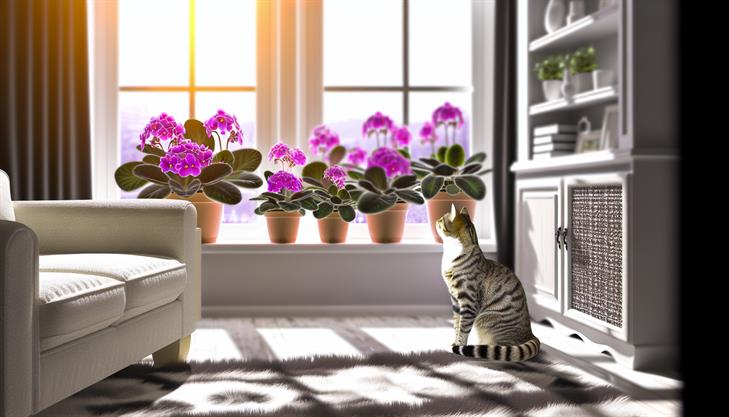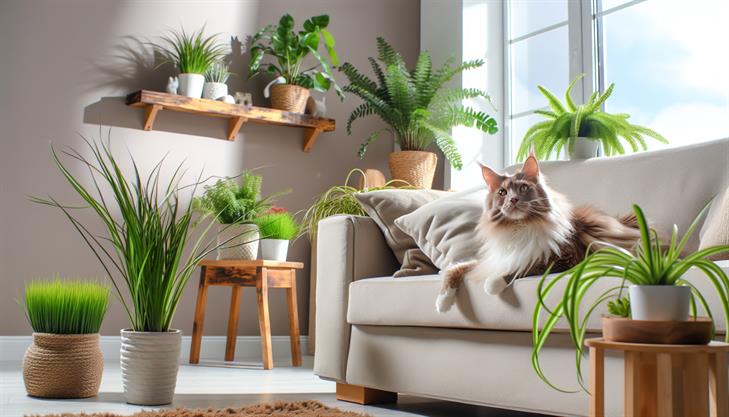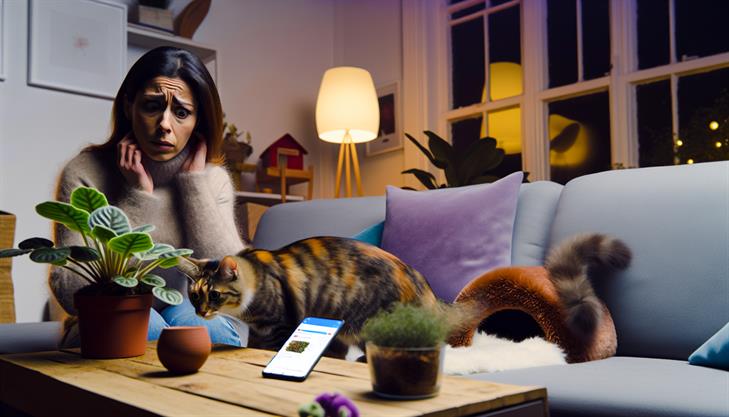As a proud parent of both leafy greens and furry friends, balancing the love for houseplants with the safety of pets can sometimes feel like a tightrope walk. African violets, with their vibrant blooms and relatively easy care, are a staple in many homes, adding a pop of color to any windowsill. But as their petals gleam in the sunlight, an important question lingers in the minds of conscientious cat owners: Are African violets poisonous to our feline companions? Understanding the potential risks and benefits these beautiful plants pose is crucial for anyone aiming to create a harmonious household. Whether you’re a seasoned green thumb worried about curious whiskers or a cat enthusiast looking to expand your plant collection, this guide will unravel the mystery surrounding African violets and felines, ensuring your home remains a safe haven for both your plants and your cats. Dive into this article to make informed decisions that cater to your love for all things blooming and purring.
Understanding African Violets and Their Toxicity to Cats
African violets are popular houseplants cherished for their vibrant blooms and ease of care. If you’re a cat owner, you might be concerned about whether these plants pose a threat to your feline friends. A common query is, "Are African violets poisonous to cats?" The good news is that African violets are not toxic to cats, making them a safe choice for pet-friendly households.
Understanding African Violets
African violets, scientifically known as Saintpaulia, are non-toxic to cats, dogs, and other pets. This lack of toxicity is a great relief for pet owners who love these decorative houseplants but want to ensure their environment is safe for their furry companions. African violets thrive indoors with the right care, and being non-poisonous, they are an excellent option for homes with curious pets.
How to Care for African Violets Around Cats
Even though African violets are safe, ensuring they are cared for correctly will prevent any unwanted issues:
-
Location and Light Requirements:
- Place your African violets in a location that receives plenty of indirect sunlight. Bright, but not direct, light is ideal as it promotes flowering without scorching the leaves.
- Avoid placing plants where cats can easily knock them over. Elevated shelves or window sills not directly accessible from a cat’s usual paths work well.
-
Watering Tips:
- Water African violets with care. They prefer to be watered from the bottom to prevent leaf spotting. Place the pot in a water-filled saucer, allowing the plant to absorb water through the drainage holes.
- Ensure the pot has adequate drainage to avoid overwatering, which can lead to root rot.
-
Soil and Fertilization:
- Use a well-draining potting mix specific to African violets. A mix that retains some moisture but doesn’t become waterlogged is best.
- Fertilize regularly with a balanced houseplant fertilizer. Follow package instructions to avoid over-fertilization, which can damage your plant.
Common Issues and Pet Safety Tips
While African violets aren’t poisonous, other houseplant care habits need attention to maintain a safe environment for your cat:
- Mulch and Soil Additives: Some soil additives or mulches used in potting mixes can cause gastrointestinal upset if ingested. Always use cat-safe products.
- Transportation of Pests: Though African violets themselves are safe, they can attract pests like aphids or mites, which are generally harmless to cats but can infest other plants in your home.
Additional Advice for Pet Owners
To further ensure your home is safe and harmonious for both your plants and pets:
- Consider setting up a dedicated plant area that can be visually stimulating for your cats without putting plants at risk. You can use floating shelves or plant stands that are out of reach.
- Regularly monitor your plants and your cat’s behavior around them. If you notice any excessive nibbling or signs of distress in your cat, consult with a veterinarian and examine possible environmental factors.
By understanding the non-toxic nature of African violets and applying this care advice, you can enjoy the lush beauty of these plants without worry. Their compatibility with cats makes them a lovely addition to any pet-friendly home.
Safe Plant Alternatives for Cat Owners
African violets are a popular choice among indoor plant enthusiasts, particularly for those who appreciate their vibrant blooms and minimal maintenance requirements. But for cat owners, the question often arises: are African violets poisonous to cats? The good news is that African violets (Saintpaulia) are non-toxic to cats, making them a safe choice for those who want to enjoy greenery without risking their pet’s health.
Before introducing these beautiful plants into your home, it’s important to understand why they’re cat-friendly and how to properly care for them. This way, you ensure both your pets and plants thrive.
Why African Violets are Safe for Cats
African violets are known for their attractive appearance and the ability to bloom multiple times a year. Their non-toxic nature is confirmed by the ASPCA, which lists them as safe for cats, dogs, and even horses. This means that if your feline friend decides to take a nibble, it should not cause any adverse reactions. However, moderation is key, as ingesting large amounts of any plant material can cause mild gastrointestinal discomfort in pets.
Caring for African Violets in a Cat-Friendly Home
To keep your African violets healthy while ensuring your cat stays safe, consider the following setup tips and advice on care:
-
Proper Placement: Position your African violets in a location where they receive bright, indirect sunlight. Direct sunlight can be too harsh and might scorch the leaves. A north or east-facing windowsill is often ideal. Ensure your cats cannot easily knock them over.
-
Soil and Pot: Use a well-draining potting mix specifically designed for African violets. This helps prevent waterlogging, which can cause root rot. Choose pots with good drainage holes to avoid water accumulation.
-
Watering Tips: African violets prefer their soil to be moist but not overly wet. Water them when the topsoil feels dry to the touch. Bottom watering (placing the pot in a dish of water and allowing the soil to soak up moisture) is a great method to prevent water splashes on the leaves, which can lead to spots or fungal issues.
-
Humidity and Temperature: Maintain moderate humidity for African violets to thrive. If your home’s air is too dry, consider placing a small humidifier nearby. Ensure room temperatures range between 65°F and 75°F, as extreme temperatures may hinder growth.
-
Preventing Cat Access: While these plants are safe, it’s wise to discourage your cat from chewing on them. Use deterrent sprays specifically designed for plants or provide alternative plants that cats love, like cat grass or catnip, to divert their attention.
-
Routine Checks: Regularly inspect your plant for any signs of stress or disease. Yellowing leaves could indicate overwatering, while droopy foliage might suggest a need for more light.
Additional Advice
To further create a harmonious environment for both your African violets and your feline companion, consider diversifying your plant collection with other non-toxic plants such as spider plants, Boston ferns, or bamboo.
Ultimately, ensuring that your home is both cat-friendly and plant-friendly requires a bit of planning and care. By following these guidelines, you can enjoy the beauty of African violets without compromising your pet’s safety. This seamless blend of nature indoors benefits not only your home aesthetic but also the well-being of your beloved pets.
Tips for Keeping Cats Away from Houseplants
When it comes to houseplants and pets, particularly cats, safety is a primary concern for pet owners. If you are a cat owner contemplating adding African violets to your collection, you might wonder, "Are African violets poisonous to cats?" Fortunately, African violets (Saintpaulia) are non-toxic to cats, making them a safe choice for homes with feline friends. Here’s how you can enjoy your houseplants while ensuring your cat stays safe:
Understanding African Violets’ Safety
African violets are widely appreciated for their vibrant blooms and ease of care. Since they are not poisonous to cats, they pose no threat if your feline companion takes a curious nibble or brushes against them. However, it is still wise to discourage your cat from chewing on any plant, as even non-toxic plants can cause mild stomach upsets from foliar residues or pesticides.
Practical Tips for Keeping Cats Away
Despite the absence of toxicity, you might still want to prevent your cat from interfering with your African violets to maintain their pristine appearance. Here are some step-by-step tips to keep your plants safe from curious paws:
-
Strategic Placement: Position your African violets on high shelves or hang them in pots from ceilings. This makes them less accessible to your cat, especially if they aren’t inclined to jump.
-
Use Barriers: Consider placing your plants in a room that your cat does not frequently enter or using decorative fencing around the plant area to deter access.
-
Natural Deterrents: Cats are generally repelled by citrus scents. Try placing orange or lemon peels in the soil as a natural deterrent.
-
Cat Grass as a Distraction: Growing cat grass or catnip nearby can provide a more appealing and safe alternative for your feline’s chewing needs.
-
Training and Redirection: Train your cat to avoid certain areas by using safe deterrent sprays. Also, use interactive play to redirect your cat’s curiosity away from plants.
Considerations While Decorating
When incorporating African violets into your home decor, ensure that they are located in areas with sufficient indirect light — as these plants thrive without direct sunshine. Providing proper care keeps your plants healthy, reducing leaf shedding that could attract your cat.
Conclusion
African violets can be a safe and beautiful addition to your indoor garden, even with cats around. Knowing that they are non-toxic allows you to focus on setting up an environment that is harmonious for both your beloved plants and pets. With the above strategies, you’ll be able to successfully keep your African violets out of harm’s way while ensuring your cat’s safety and well-being.
What to Do If Your Cat Eats an African Violet
If you’re a cat owner with a love for indoor plants, particularly African violets, you might be concerned about the safety of these plants around your furry friend. Fortunately, African violets (Saintpaulia species) are not known to be toxic to cats. However, it’s essential to know what actions to take if your curious cat decides to nibble on these popular houseplants.
Understanding the Safety of African Violets
African violets are generally considered safe for cats. They are non-toxic, which means if your cat ingests any part of the plant, it should not cause immediate harm. However, that doesn’t mean you should ignore it if your cat decides to take a bite. Even non-toxic plants can sometimes cause mild gastrointestinal upset in pets.
What to Do If Your Cat Eats an African Violet
If you’ve caught your feline friend nibbling on your African violet or notice some missing leaves, here’s a step-by-step guide on what actions to take:
-
Observe Your Cat: Initially, keep an eye on your cat’s behavior. Look for any signs of distress, such as vomiting, diarrhea, loss of appetite, or unusual lethargy. While these are uncommon with African violet ingestion, every cat’s reaction can vary.
-
Provide Fresh Water: Make sure your cat has access to fresh water. Drinking water can help in flushing out any potential irritants from your cat’s system.
-
Remove Plant Access: Temporarily relocate your African violets out of your cat’s reach. Consider placing them on high shelves or using hanging planters. This not only protects the plant but also prevents your cat from indulging in a chew.
-
Consult Your Veterinarian: If you notice any troubling symptoms, or if your cat has eaten a significant amount, it’s wise to consult your veterinarian for advice. Bring details of what and how much your cat has eaten for the best guidance.
-
Offer Safe Alternatives: If your cat seems to enjoy munching on plants, consider offering cat-safe grasses, like catnip or wheatgrass, to divert their attention from your houseplants.
Additional Tips for Plant and Cat Owners
- Training: Try to train your cat not to chew on plants by using safe deterrents like sprays or providing toys and cat trees for distraction.
- Plant Safety Verification: While African violets are safe, always check the toxicity of any new plant you bring into your home.
- Regular Health Checks: Regular vet check-ups can help ensure your cat is healthy and can quickly address any questionable behavior or symptoms.
Remember, while African violets are not poisonous to cats, keeping plants away from pets is always a prudent approach. It ensures that your cat remains curious but safe, and your plants stay beautiful and intact.
Troubleshooting: Common Concerns and FAQs on Pet-Safe Plants
African violets are a popular choice for indoor gardeners due to their vibrant blooms and relatively easy care. For pet owners, a common concern is whether African violets are safe to have around their furry companions, particularly cats. Let’s address this concern with clear and helpful information.
Are African Violets Poisonous to Cats?
The good news for pet owners is that African violets, botanically known as Saintpaulia, are non-toxic to cats. This makes them an excellent choice for households with curious felines. Unlike certain household plants that can pose serious risks to your pets, African violets do not contain any substances that are harmful if ingested.
Tips for Keeping Cats Away from Plants
Even though African violets aren’t harmful to cats, you might still want to keep your kitties away to prevent potential messes or plant damage. Here are some steps you can take:
-
Strategic Placement: Position your African violets in spots that are difficult for your cat to reach. High shelves or hanging baskets are excellent options.
-
Use Deterrents: Certain scents, such as citrus or peppermint, naturally repel cats. Placing peels or cotton balls soaked in essential oils close to your plants might help.
-
Alternative Distractions: Provide your cat with its own plants to chew on, such as cat grass or catnip, to divert attention away from your African violets.
-
Water Setup Tips: Create consistent watering routines to ensure plant health. African violets thrive on consistent moisture levels, so keep the soil slightly moist but not soggy.
Common Issues in Growing African Violets
In addition to placement and care considerations for pet safety, you may encounter other challenges in growing African violets:
-
Overwatering: This is a common issue; aim for well-drained soil and water when the top inch feels dry.
-
Insufficient Light: African violets need bright but indirect light. East-facing windows are often ideal placement spots.
-
Pest Concerns: While African violets are not hazardous to pets, they can attract pests like spider mites or aphids. Regularly inspect your plants, and use safe insecticidal soap if necessary.
By following these tips, you can ensure your African violets thrive without posing any risks to your cats. Whether you’re a seasoned gardener or a beginner, understanding the needs of both your plants and pets will create a harmonious and safe environment indoors.
In conclusion, understanding whether African violets are poisonous to cats is crucial for pet owners who want to ensure a safe and healthy environment for their feline companions. As we’ve explored, African violets are not toxic to cats, making them a cat-friendly option for households looking to enhance their indoor plant collection without compromising their pet’s well-being. This finding allows for a sigh of relief for those who adore these vibrant plants and want to share their beauty in a pet-friendly home.
Furthermore, while African violets themselves pose no harm, it’s still essential to maintain a general awareness of your cats’ interactions with houseplants. Monitoring for any signs of plant ingestion and ensuring that all household plants are verified safe can prevent possible health issues. Lastly, if you’re introducing new plants to your home, always do a quick check to ensure their safety for pets.
As a final tip, consider placing your African violets in spots where they can receive optimal care and sunlight, yet are not easily accessible to overly curious cats. This not only keeps your plants healthy but also discourages cats from developing a habit of nibbling on household greenery.


